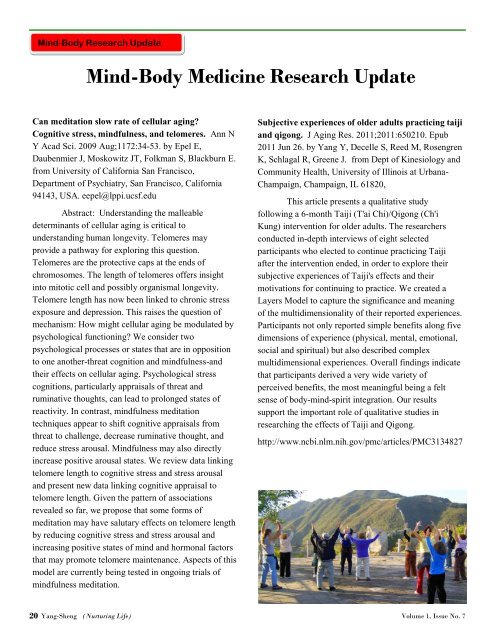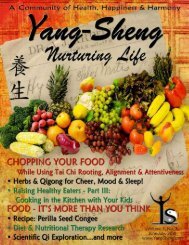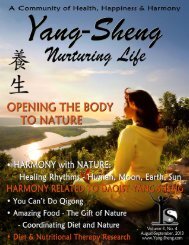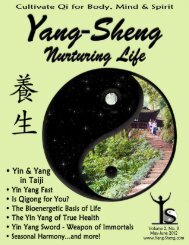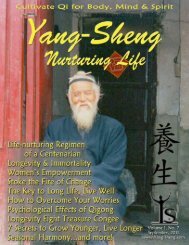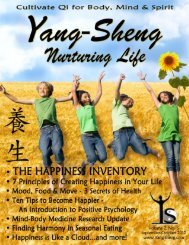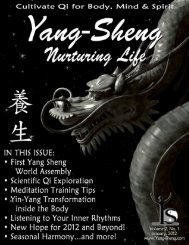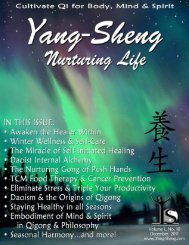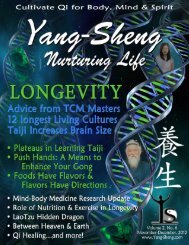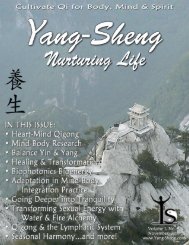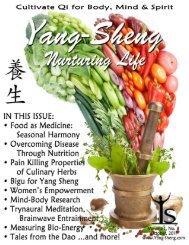Click to download the entire September issue as a PDF - Yang-Sheng
Click to download the entire September issue as a PDF - Yang-Sheng
Click to download the entire September issue as a PDF - Yang-Sheng
You also want an ePaper? Increase the reach of your titles
YUMPU automatically turns print PDFs into web optimized ePapers that Google loves.
Mind-Body Research Update<br />
Mind-Body Medicine Research Update<br />
Can meditation slow rate of cellular aging?<br />
Cognitive stress, mindfulness, and telomeres. Ann N<br />
Y Acad Sci. 2009 Aug;1172:34-53. by Epel E,<br />
Daubenmier J, Moskowitz JT, Folkman S, Blackburn E.<br />
from University of California San Francisco,<br />
Department of Psychiatry, San Francisco, California<br />
94143, USA. eepel@lppi.ucsf.edu<br />
Abstract: Understanding <strong>the</strong> malleable<br />
determinants of cellular aging is critical <strong>to</strong><br />
understanding human longevity. Telomeres may<br />
provide a pathway for exploring this question.<br />
Telomeres are <strong>the</strong> protective caps at <strong>the</strong> ends of<br />
chromosomes. The length of telomeres offers insight<br />
in<strong>to</strong> mi<strong>to</strong>tic cell and possibly organismal longevity.<br />
Telomere length h<strong>as</strong> now been linked <strong>to</strong> chronic stress<br />
exposure and depression. This raises <strong>the</strong> question of<br />
mechanism: How might cellular aging be modulated by<br />
psychological functioning? We consider two<br />
psychological processes or states that are in opposition<br />
<strong>to</strong> one ano<strong>the</strong>r-threat cognition and mindfulness-and<br />
<strong>the</strong>ir effects on cellular aging. Psychological stress<br />
cognitions, particularly appraisals of threat and<br />
ruminative thoughts, can lead <strong>to</strong> prolonged states of<br />
reactivity. In contr<strong>as</strong>t, mindfulness meditation<br />
techniques appear <strong>to</strong> shift cognitive appraisals from<br />
threat <strong>to</strong> challenge, decre<strong>as</strong>e ruminative thought, and<br />
reduce stress arousal. Mindfulness may also directly<br />
incre<strong>as</strong>e positive arousal states. We review data linking<br />
telomere length <strong>to</strong> cognitive stress and stress arousal<br />
and present new data linking cognitive appraisal <strong>to</strong><br />
telomere length. Given <strong>the</strong> pattern of <strong>as</strong>sociations<br />
revealed so far, we propose that some forms of<br />
meditation may have salutary effects on telomere length<br />
by reducing cognitive stress and stress arousal and<br />
incre<strong>as</strong>ing positive states of mind and hormonal fac<strong>to</strong>rs<br />
that may promote telomere maintenance. Aspects of this<br />
model are currently being tested in ongoing trials of<br />
mindfulness meditation.<br />
Subjective experiences of older adults practicing taiji<br />
and qigong. J Aging Res. 2011;2011:650210. Epub<br />
2011 Jun 26. by <strong>Yang</strong> Y, Decelle S, Reed M, Rosengren<br />
K, Schlagal R, Greene J. from Dept of Kinesiology and<br />
Community Health, University of Illinois at Urbana-<br />
Champaign, Champaign, IL 61820,<br />
This article presents a qualitative study<br />
following a 6-month Taiji (T'ai Chi)/Qigong (Ch'i<br />
Kung) intervention for older adults. The researchers<br />
conducted in-depth interviews of eight selected<br />
participants who elected <strong>to</strong> continue practicing Taiji<br />
after <strong>the</strong> intervention ended, in order <strong>to</strong> explore <strong>the</strong>ir<br />
subjective experiences of Taiji's effects and <strong>the</strong>ir<br />
motivations for continuing <strong>to</strong> practice. We created a<br />
Layers Model <strong>to</strong> capture <strong>the</strong> significance and meaning<br />
of <strong>the</strong> multidimensionality of <strong>the</strong>ir reported experiences.<br />
Participants not only reported simple benefits along five<br />
dimensions of experience (physical, mental, emotional,<br />
social and spiritual) but also described complex<br />
multidimensional experiences. Overall findings indicate<br />
that participants derived a very wide variety of<br />
perceived benefits, <strong>the</strong> most meaningful being a felt<br />
sense of body-mind-spirit integration. Our results<br />
support <strong>the</strong> important role of qualitative studies in<br />
researching <strong>the</strong> effects of Taiji and Qigong.<br />
http://www.ncbi.nlm.nih.gov/pmc/articles/PMC3134827<br />
20 <strong>Yang</strong>-<strong>Sheng</strong> (Nurturing Life) Volume 1, Issue No. 7


